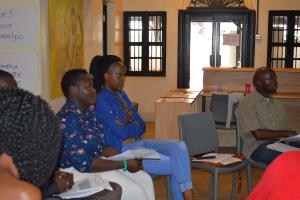Event reports
How does the writing style of a policy brief differ from the one of an academic paper? How do I target the relevant audience for my recommendations? And lastly, how do I support my findings with relevant data?
The 2nd Policy Development Seminar of the 2018 Youth4Policy (Y4P) fellow class primarily focused on answering those three questions. Throughout the day, the participants further developed their preliminary policy research ideas, exchanged ideas and attended in the evening a networking barbeque at the Konrad-Adenauer-Stiftung (KAS) country director’s residence.
The morning started with an interactive input session on how to write a convincing policy brief. Yusuf Kiranda, Y4P Program director, first collected questions from the fellows to address occurring challenges during his presentation. The basis for writing a coherent and compelling policy brief is a sound literature review. “If you think you have read enough, read more, take another book, another paper, another brief”, was his ultimate proposal for the fellows. The challenging task then is, to distil only the most important and relevant material out of this vast literature background. This is required though, to be able to present substantial evidence when trying to convince the target audience. After this, Yusuf presented the six structural elements of a standard, short policy brief. They comprise inter alia a rationale for the urgency of the problem as well as a review of existing policy interventions on which then your own recommendations can be built upon.
The main part of the seminar then focused on applying the theoretically gained knowledge and putting it into practice. The Y4P fellows split into three groups and undertook three different exercises. First, the fellows focused on defining their respective target audiences. This is a key step as the policy recommendations should be specifically tailored to them and the brief should take into account their situation. The second exercise concentrated on the use of graphs and data. Thereby, fellows learned how to present their research statistics in a coherent manner as well as how they could support their claims by using adequate charts.
Lastly, they reviewed elements of a well written policy brief by pointing out shortcomings of a less convincing one. In between those group sessions, fellows used the chance to present to each other their research ideas and used the lunch break for a general exchange. In the afternoon, participants engaged directly with their focal persons in a discussion about their chosen research topics and structured their preliminary ideas.
In the afternoon, the Youth4Policy fellows discussed in depth their research interest and progress with their respective focal persons and in the groups. The fellows sat together with each focal person to discuss the progress of their research. The last part of the seminar ended with an open, proactive feedback round where fellows and staff collected ideas on how to improve their future work. Afterwards, KAS country director Mathias Kamp hosted a networking barbeque meetup where our fellows could meet members of the Young Leaders Think Tank, KAS scholarship holders, UNIFOG, National Youth Council, Youth Political Leaders from the different political parties and other KAS youth partners.
Overall, the second seminar provided the fellows with the opportunity to acquire adequate writing skills and structure for drafting convincing policy briefs. We are already looking forward to our third and last seminar at the end of August.





